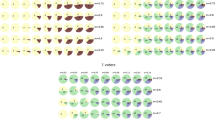Abstract
The paper discusses various representations of collective decisional skill which are useful in the evaluation of decision structures. The recursion formulas we give here and the use of the concepts of majority deficiency as well as majority and unanimity games present expedient approaches in analyzing collective competence. Using the simple majority system as benchmark, applications to certain hierarchic decision structures are presented. The resulting inequalities dealing with collective decisional skills of hierarchic systems are an improvement of previous published results.
Similar content being viewed by others
References
Ben-Yashar, R., and S. Nitzan. (1997). “The Optimal Decision Rule for Fixed Size Committees in Dichotomous Choice Situations – The General Result, ” International Economic Review 38, 175–187.
Berg, S. (1993). “Condorcet's Jury Theorem, Dependency Among Voters, ” Social Choice and Welfare 10, 87–96.
Berg, S. (1996). “Condorcet's Jury Theorem and the Reliability of Majority Voting, ” Group Decision and Negotiation 5, 229–238.
Berg, S. (1997). “Indirect Voting Systems: Banzhaf Numbers, Majority Functions and Collective Competence, ” European Journal of Political Economy 13, 557–574.
Berg, S., and J. Paroush. (1998). “Collective Decision Making in Hierarchies, ” Mathematical Social Sciences 35, 233–244.
Boland, P. (1989). “Majority Systems and the Condorcet Jury Theorem, ” The Statistician 38, 181–189.
Boland, P., F. Proschan, and Y. Tong. (1989). “Modelling Dependence in Simple and Indirect Majority Systems, ” Journal of Applied Probability 26, 81–88.
Dubey, P., and L. Shapley. (1979). “Mathematical Properties of the Banzhaf Power Index, ” Mathematics of Operations Research 4, 99–131.
Felsenthal, D., and M. Machover. (1998). The Measurement of Voting Power. Cheltenham: Edward Elgar Publishing.
Fishburn, P., and W. Gehrlein. (1977). “Collective Rationality versus Distribution of Power of Binary Social Choice Functions, ” Journal of Economic Theory 16, 72–91.
Gradstein, M., and S. Nitzan. (1986). “Performance Evaluation of Some Special Classes of Weighted Majority Rules, ” Mathematical Social Sciences 12, 31–46.
Karotkin, D. (1996). “Justification of the Simple Majority and Chairman Rules, ” Social Choice and Welfare 13, 479–486.
Ladha, K. (1993). “Condorcet's Jury Theorem in Light of de Finetti's Theorem; Majority Voting with Correlated Votes, ” Social Choice and Welfare 10, 69–86.
Nitzan, S., and J. Paroush. (1982). “Optimal Decision Rules in Uncertain Dichotomous Choice Situations, ” International Economic Review 23, 289–297.
Nitzan, S., and J. Paroush. (1985). Collective Decision Making: An Economic Outlook. Cambridge, MA: Cambridge University Press.
Owen, G. (1975). “Multilinear Extensions and the Banzhaf Value, ” Naval Research Logistic Quarterly 22, 741–750.
Owen, G., B. Grofman, and S. Feld. (1989). “Proving a Distribution-free Generalization of the Condorcet Jury Theorem, ” Mathematical Social Sciences 17, 1–16.
Paroush, J. (1997). “Order Relations Among Efficient Decision Rules, ” Theory and Decision 43, 209–218.
Shapley, L., and B. Grofman. (1984). “Optimizing Group Judgmental Accuracy in the Presence of Interdependence, ” Public Choice 43, 329–343.
Author information
Authors and Affiliations
Rights and permissions
About this article
Cite this article
Berg, S., Marañon, A. Collective Decisional Skill and Decisive Voting Games - Some Results. Group Decision and Negotiation 10, 389–403 (2001). https://doi.org/10.1023/A:1011831413677
Issue Date:
DOI: https://doi.org/10.1023/A:1011831413677




